Tuesday, December 3, 2013
Monday, September 9, 2013
Monday, July 8, 2013
Rithmatist Review
 The Rithmatist by Brandon Sanderson
The Rithmatist by Brandon SandersonMy rating: 4 of 5 stars
This book was enjoyable, even for a YA book. Unlike the Alcatraz books, this one is serious, but keeps it's tone pretty light, especially with the main character, Joel, who is so enthusiastic that it is contagious. He's devoted to learning about rithmatics, making chalk drawings come to life, but unfortunately, he's not one himself, so he can just study it when allowed, but can't actually do it. Most of the book, you're wondering if he'll become one himself or not, I won't spoil it here, but at least at the beginning, you get the point of view of someone who isn't a rithmatist, which helps, having Joel not be a superpowered rithmatist who can use all 8 or 10 or 12 metals, I mean, knows all the defenses. Sometimes having a powerful hero is appropriate, other times, we want a Frodo, who has no magic but gets things done. At first I thought it would be a stand alone book, but at the end there were some twists that entail another book, maybe more, as well as keeping it from going into the Harry Potter zone. It was easy reading, a brisk adventure set in an alternate history. The world wasn't explored much, but there are plenty of things to explore later on. While no Way of Kings, it is fun to read. I can imagine an IPad app coming out, where you can actually draw out the circles and defenses and send out little chalklings. I mean, Sanderson already wrote a book for Infinity Blade, now he can have his own game out there. We'll see.
View all my reviews
Sunday, June 23, 2013
 Inferno by Dan Brown
Inferno by Dan BrownMy rating: 3 of 5 stars
This book follows the same pattern as Dan Brown's other Robert Langdon books: Robert Langdon has to solve some mystery and stop some bad guy, who loves to play scavenger hunt with old Christian artwork, who have hidden meanings, and for some reason, there's a time limit, there's a girl he has to explain everything to, and there's a betrayal. Robert Langdon wakes up in Florence, doesn't know how he got there, and people are trying to kill him. He has a mini projector that shows a painting, The Map of Hell, based on Dante's Divine Comedy, and from some changes in that, he goes off looking for more paintings and artworks. This book, he's accompanied by another beautiful girl, since he can't keep a relationship from the other books. This girl is Sienna, who supposedly has an IQ of 208, making her smarter than Albert Einstein and Isaac Newton, but she sure doesn't seem like it. Robert is always showing her up with his knowledge, and she basically follows him, figuring out a few things along the way but mostly serving as way for Robert to show how smart and awesome he is. Despite all Brown's talk in the Da Vinci Code about the sacred feminine and the Catholic church repressing females, his characters seem kind of misogynistic as well. The enemy of the book is a genius billionaire man who realizes the world is overpopulated and the population has to be reduced to 4 billion, or else we'll run out of resources and all die, and he decides to take manners into his own hands. He likes to quote the Divine Comedy, but the work itself doesn't really fit in with anything, just as imagery of people dying and suffering. It's not like the Da Vinci Code where the works of art supposedly suggest that Jesus had a wife and children, not that I really believe that's what Leonardo, who lived 1500 years after Christ, was trying to say. SPOILER ALERT: (view spoiler)[The whole scavenger hunt in Inferno is a total waste, as the plague had already been released and nothing Robert Langdon does has any effect on the plague, and the people he's running from are on his side. (hide spoiler)] Despite the thriller part of this book, which feels kind of forced, especially once the revelations at the end come in, it eventually disappoints, not really offering what I think is a realistic solution to the problem of overpopulation. In the end, these books feel like hyper fast tours of different musuems and artwork in a certain place, ie: France, Washington, and Italy. The plots and quests for knowledge feel forced and pointless after getting to the end, but the journey to the end is gripping and interesting, and there is some educational material, mixed with conspiracy theories. Fun, but not to be taken seriously.
View all my reviews
Labels:
Dan Brown,
Dante,
Fiction,
Inferno,
Italy,
Literature,
Review,
Robert Langdon,
Symbols
Wednesday, June 12, 2013
1984
 1984 by George Orwell
1984 by George OrwellMy rating: 4 of 5 stars
Some people think that George Orwell got everything right, just missed the date by 30 years (that it should be 2014). I'm here to tell you that that is false and ridiculous. How could anyone ever believe that? First of all, this is complete science fiction. I mean, look at the technology in the book. It's all based on spying on you. There are TVs that look back at you. As if that were possible. (By the way, did you hear about the awesome Xbox One, where the Kinect can monitor your heartbeat, hands, and eyes? They say it needs to connect to the internet every 24 hours, as well, I guess for updates or things like that. Surely not to upload your data. We know we can trust this, because it's made by Microsoft, a good ol' American company.) In the book, there's also microphones everywhere, capturing your conversations. Lining the streets and country with microphones would be impossible, and would catch all the noise that wasn't wanted, like footsteps and crickets. If only people used devices to talk into, that would make recording conversations much easier. Now, aside from technology, it would be impossible for our government to ever be so corrupt and untransparent. There's no way we would listen to political messages that told us everything was ok, things were getting better, and try to indoctrinate us to their side. Plus, we have two political parties, they only had one. For us to revert to only one, the one in power would have to abuse that power to supress the other side. That would never happen. Orwell got it wrong in that he completely missed the internet, where we can speak out and do whatever we want anonymously, and no one would ever collect data on what we do with the internet in order to monitor conversations or try to sell us stuff. Nope, I know I'm safe with Facebook. And we all know that if we found out the government was spying on us, we would never tolerate it. For that to happen, some big event, a disaster, would have to strike terror in our hearts, and then maybe the government would step in, supposedly for our safety. But nothing like that has happened, nor will it, since we all love each other and everyone loves the United States. I hope you all realize that this book is obsolete and doesn't even deserve mention anymore, as Orwell got everything wrong. We all know our biggest threat is a Korean man who has nuclear missiles, and our government is doing everything they can to stop him.
Please leave comments on this post. At the very least, let the NSA agent who's monitoring you while you read this know you recognize his hard work and dedication.
Not doing so would be rude.
View all my reviews
Labels:
1984,
Cell phones,
CIA,
Communism,
IRS,
NSA,
Orwell,
scandals,
Science Fiction,
snooping,
spying,
xbox one
Tuesday, June 11, 2013
Fallen ebook
For any of you have been following my blog, you probably have noticed my short stories. Well, now they are available in one place, conveniently in ebook format (soon to come to kindle as well). It includes all the short stories on this blog, including the full version of Fallen (known as Apple on this site). The book also comes with the covers I’ve made, as well as the prologue for book one of Sage Eyes. Hope you enjoy, please support!
Fallen and Other Short Stories, an Ebook by Matthew Barrett
http://www.smashwords.com/books/view/325151
Tuesday, May 21, 2013
Ruins review
 Ruins by Orson Scott Card
Ruins by Orson Scott CardMy rating: 3 of 5 stars
I enjoys Orson Scott Cards' books, and read most of them, but sometimes, in some of his books, his characters become too powerful, in a way. Plus, the main character in nearly every book he writes is a precocious teenage boy. They're the only ones who can do what they do, but have very little temptation to do evil with it. The character in Treason by the end was way too powerful, Alvin in his Alvin Maker books could change everything, and the boy in his other series he's writing, beginning with the Lost Gate, also started feeling too powerful by being able to teleport wherever he wants. Their problems feel trivial because there is no one who can oppose them. This series is starting to feel the same. Rigg before had to depend on his friend to go back in time, but in this book he can do it alone. His friend obviously feels jealous, but it feels like half the book deals with him whining, or some other character, and the others trying to tell them why they're not worthless. Since the main character can go back in time, there's not much feeling of urgency, even though the world is supposed to be destroyed in a few years time. The ideas explored here are interesting, and it was an engaging read. The time travel is hard to understand at times, though. Some ideas got weird, like the mice, and other ideas seemed to jump all over. I was hoping the series would end with this book, but it looks like another one will be coming.Anyway, interesting book, but hopefully the next one will be more focused and will finish this, because the idea is already feeling stretched.
View all my reviews
Lord of the Rings Review
 The Lord of the Rings by J.R.R. Tolkien
The Lord of the Rings by J.R.R. TolkienMy rating: 4 of 5 stars
Even though this is considered the beginning of modern fantasy and kicked off the genre and a bunch of copy cats, this isn't, in my opinion, the best fantasy ever. Especially the books, the way they're written. In reality, I feel the movies are better. Part of it is because Tolkien was more focused on his world, mythology, and language than he was on the actual story and characters. Don't get me wrong, it is a great story, epic, and affected me profoundly the first time I read it, even though I was in the sixth grade. A few years later, when the movies came out, I read them again, understood them better, but since then, haven't had the desire to read them again. They were a chore to read. So much history crammed in, songs, and other things to detract from the main story. Other parts were unnecessary, like the razing of the Shire, which I think was wisely taken out of the movies, as it was anticlimactic. The characters were flat, either almost perfectly good or perfectly evil. Even the races were stuck in their roles, the elves all good, the orcs evil, etc. It wasn't until later that I realized this is a story about the world created, the language used, the mythology of middle earth. Tolkien was more involved with the setting than the characters or the story. The story serves more as a tour of middle earth than anything else. Still, the story is interesting and epic, and Frodo defeating Sauron was an intense moment in fantasy literature. It served to inspire and mark me, help me come up with my own fantasy world (which I don't think copies his very much). So while there are flaws, buried underneath it there is a pretty good story and a well developed world.
View all my reviews
Assassin's Apprentice Review
 Assassin's Apprentice by Robin Hobb
Assassin's Apprentice by Robin HobbMy rating: 3 of 5 stars
My experience with Robin Hobb up till now has not been good. I first read the Soldier's Son Trilogy, which I found nearly painful to read. The main character obsessed over his weight so much he felt like a girl, and was always depressed and nothing much seemed to happen. Admittedly, it's been a few years, so I might be oversimplifying, but I remember I did not enjoy it much. Then I read the first book of the Tawny Man series, which is a sequel to this series, although I didn't realize it. So I had no idea what was going on, and it moved really slow. So I came to this book with trepidation, but still, I had heard that Robin Hobb was such a great author, she had to have something good. I started reading it, and found it was a better experience than I feared.
The good
It was down to earth, not over the top like so much literature now. The world felt well realized, and the main character was far from overpowered.
The magic was interesting because so little was known about it. Fitz sensing animals was nothing special, but it was interesting that we don't know if he will go crazy like others who had the same ability. As for the Skill, still don't know much about it, but it does appear a lot subtler than most magic.
The villain wasn't overpowered either. No one is in complete control, but everyone is struggling to get some sort of power and keep it.
The bad
Having royalty with names like Shrewd, Regal, Chivalry, and then having to act out that attribute, was a little strange and out of place.
The main character felt more like a blank boy than someone with a real personality. He get depressed easily and ended up doing nothing for a while.
He was supposed to be training to be an assassin, but this is not believable at all. The only people he kills are soulless beings, and when given a real assignment, he can't do it. Sure, there should be moral questions, but Fitz never remotely seemed like he could ever be a real assassin. I knew he wouldn't kill his target at the end, so there was no surprise there.
The pacing was slow. Not as big a problem as some of the other books of hers, but I was in no hurry to finish it. There wasn't much suspense or anything to look forward to. I'm not even sure I feel compelled to read the next ones in the series. We'll see.
Overall, a solid book, but nothing really amazing in my opinion. Good in comparison to the other Robin Hobb books I have read.
View all my reviews
Thomas Covenant Review
 The Chronicles of Thomas Covenant, the Unbeliever by Stephen R. Donaldson
The Chronicles of Thomas Covenant, the Unbeliever by Stephen R. DonaldsonMy rating: 3 of 5 stars
If you don't know what these books are about, Thomas Covenant is a modern leper who has lost his wife and most everything else. After an accident, he finds himself in "The Land", a land of fantasy creatures and people threatened by Lord Foul (the names in these books are not that original). Thomas' wedding ring is supposedly a powerful artifact to combat Lord Foul. But Thomas believes it's all in his head and doesn't think his choices matter. The people all believe in him, but he doesn't want them to. I wanted to like the books, but the writing style was very hard for me. Maybe I'm used to different styles, but it was hard for me to follow what was going on, and at times I got bored. I struggled to finish the first trilogy and couldn't bring myself to read the second. There were some good ideas, like Thomas refusing to shave to see if he would have a beard in his own world, although he then shaves it off and defeats the purpose. The concept, that you're responsible for your actions, whether they really affect other people or not, is interesting. Does it apply to things like World of Warcraft? Anyway, the descriptions didn't help me picture The Land very well, and Thomas was always whining and feeling sorry for himself, so it was a tough read. But it does take a different angle to fantasy than Lord of the Rings, where every character is perfectly good or evil.
View all my reviews
Alcatraz review
 Alcatraz Versus the Evil Librarians by Brandon Sanderson
Alcatraz Versus the Evil Librarians by Brandon SandersonMy rating: 4 of 5 stars
This series is for young adults, but that shouldn't stop you. It is hilarious. The premise is that librarians are evil, and since they control all the information, they can brainwash. It's all a giant controversy, they even managed to hide away a continent of people who rebel against them. The main character, Alcatraz, finds out that his father is one of these rebels and that his family all has talents (his is to break things...really). Those with talents all have prisons named after them, hence Alcatraz (there are others, but my favorite was a girl named Australia). They fight against the librarians using their supposed talents, and Alcatraz becomes something of a celebrity among the rebels. Brandon Sanderson is really creative with this, like one chapter in one book where they just quote Hamlet when talking. There were several times I burst out laughing. My only real complaint is that the books ended somewhat abruptly, I would love to see more.
View all my reviews
Sunday, May 19, 2013
City of Bones Review
 City of Bones by Cassandra Clare
City of Bones by Cassandra ClareMy rating: 3 of 5 stars
I read this book as I heard that there would be a movie coming out, and it seemed to be pretty popular. It felt like a mashup between Percy Jackson and Twilight, with some Star Wars family drama thrown in. It is an easy read, targeted towards teenagers, especially girls, I presumed just from the cover. The protagonist, Clary (notice how the author's last name is Clare, although that itself is actually just a pen name), is not particulary strong in this book, at least. She pretty much just reacts to everything, and sometimes convinces Jace, her hunky shadowhunter demonslayer guy, to do stuff for her. The problem I always have with a supernatural urban setting is this: it starts out normally, then the main character starts seeing strange things, and then finds out there is a whole world of magical creatures like vampires and werewolves living among humans, but no one is smart enough to figure it out except this teenager. Even if magic is involved, you'd think that all the stuff getting destroyed by their fights would rouse people to attention. Then there is the infodump, where some wise character explains detail by detail how they hid themselves for thousands of years, and is about to explain some vital secret when they get interrupted by demons or something and once things calm down, the character conveniently forgets to continue explaining until later. Again, like in Percy Jackson, I never felt like the characters were in much danger. There's such a limited cast that I doubt anyone's going to die. There's a fight with a greater demon and they kill him with some sunlight. Still, plenty of revelations, although many were obvious. Not the most sophisticated read, but if you don't have high expectations, it's fine, goes quickly.
View all my reviews
First Law Trilogy Review
 The First Law Trilogy by Joe Abercrombie
The First Law Trilogy by Joe AbercrombieMy rating: 2 of 5 stars
This has some spoilers, so if you really want to read through the series, don't read this review.
So everyone seems to like these books because they turn the fantasy world upside down. There's the usual tropes, the quest, with the prince, the barbarian, the warrior princess, and the mage, off to find some mysterious artifact that will stop some dark lord. Fairly familiar, except that everyone is a jerk and they never find the dumb artifact. Theres also a crippled torturer who is supposed to gain sympathy. So there are some interesting twists, and if I were to judge this on the first book alone, without having read the others, I might have given this a higher score. It was intriguing, and you want to find out what's next. Are things going to get better? No. That's the problem. Maybe I judge books too much on their ending, but if they don't end satisfactorially for my, then I'm not happy, even if it was good up till then. The noble is a self righteous jerk. The warrior girl is blind to everything but her own revenge, which she never gets. The mage looks at everyone else as inferiors and tools. The barbarian is the most sympathetic, but he's pretty much just along for the ride. The torturer is just that: he tortures people. Just because we get to see his point of view doesn't make him good or sympathetic. He does some bad things. And the ending is a total let down. It feels like someone played a prank on me. I read three books just for this? So back to the first point. It turns the fantasy genre upside down. I think the genre needs to look at itself now and then and not just follow blindly what others, like Tolkien, have done. But making the whole thing pointless? That turned me off. If you like gritty, you might like this, but if not, don't bother.
View all my reviews
The Death Gate Cycle Review
 The Seventh Gate by Margaret Weis
The Seventh Gate by Margaret WeisMy rating: 3 of 5 stars
So I'm going to rate the whole series. I've been reading these books for some time now, between other books. There are seven in total, quite a long series. It has an interesting premise. There are five races: humans, elves, dwarfs, sartan, and patryn. The first three are roughly the same strength, while the latter two are supposed to be much more powerful and consider themselves demigods, if not gods outright, but they are bitter foes, the sartan supposedly good and the patryn supposedly bad. A long time ago, the sartan, fearing the patryn, used their magic to lock them up in a labyrinth, their prison, and to divide the world into four elements, earth, water, fire, air. Each world would emphasize one of these elements, so in the air world, there are floating continents, but little water. Supposedly, the resources would be shared between the worlds and everyone would be happy and in paradise, the sartan watching over the lower races. But then they disappeared and left the humans, elves, and dwarfs by themselves, having to duke it out for their resources. The books begin with one patryn, Haplo, who had broken free from the terrible labyrinth, being sent out to explore these worlds and find out what happened to the sartan. At first, the books explore the cultures and how each race adapted to their environments, which is a bit interesting, there are some unique ideas, but later on it gets a little complicated, with evil incarnate trying to disrupt everything. Early on, Haplo find Alfred, a bumbling sartan, and even though they are enemies, are forced to work together. For most of the series, Haplo is an antihero, the villain who is going to conquer everything, but then he slowly is converted to good, and builds a relationship with Alfred. Unfortunately, I felt that relationship was altogether too abrupt, with them becoming pals in the sixth book. It was more interesting with the tension between them. The last three books felt like they lost their way, once they stopped describing the worlds. And while the worlds and cultures were interesting, they felt underpopulated. I didn't feel there were great cultures to be explored, just a few squabbling nobles to try to represent them. The elves, humans, and dwarfs were all so similar, it didn't feel necessary to have them. I don't mind these races, but only when there is a reason to have them, something unique about them. The characters were mostly filler, and I didn't really care about the lower race characters. Even Haplo and Alfred didn't feel well rounded. And every leader of the people was stupid, something I would call lazy writing if I couldn't compare them to the leaders in the government today (just kidding). The ending wasn't great. The wizard Zafnib just called attention to the fact that these were books and dated them, using cultural references from the 80's and 90's, although some of the jokes were funny...at first. Anyway, they had an interesting premise but weren't executed perfectly. Reminiscent of the Dragonlance books, but in a less predictable setting.
View all my reviews
The Gate Thief
 The Gate Thief by Orson Scott Card
The Gate Thief by Orson Scott CardMy rating: 3 of 5 stars
Like Pathfinder, this series gets more philosophical in the second book and a lot less happens. In the first, Danny was discovering his powers, balancing his power with responsibility and a thirst for friendship. Now he just uses his friends to bounce ideas off, and they pretty much talk for the whole book. Moral issues are an interesting and important part of having superpowers, often not explored enough, but there does need to be a balance, and discussion should flow naturally from the situations presented, instead of in dry dialogue. One of the most frustrating things was that every girl was trying to throw herself at Danny. Maybe plausible, once they knew he had powers, although it was stretching, but the most frustrating part was the reasons given for it. They just wanted to get pregnant, have his baby, because he was powerful and they were attracted to power. These are adolescent girls, I really don't think that even if they wanted to have sex with him, it would be about getting pregnant. Even if there is the subconscious biological urge, most girls wouldn't articulate these ideas. Danny resists, which I don't have a problem with, since sex is a cause of so many problems in the world today, but the way he does it is so unbelievable. He is so divorced from his emotions, with his head thinking pure logic, and we don't feel the struggle. In that type of situation, there would be a lot of confusion, trying to be good morally, wanting to give in emotionally, and logic probably wouldn't enter, just would knock timidly from the outside while emotions wrestled. Time after time, the situation goes like this: Danny finds himself alone with girl. Girl moves forward, making obvious advances, saying she wants to have his baby. Danny thinks: oh, this is biological, she just evolved this way. Oh, I evolved to respond to this. My body would be pleased. But this is wrong. She doesn't know what she's doing. Teleport away. Safe! It felt like an insult to women everywhere, to suggest they would all throw themselves on anyone with a bit of power. Still, other ideas were interesting, and when there was action, it was entertaining enough, plus the revelations got you hooked. I would have liked having other powers explored more, instead of just gating. The final conflict was anticlimatic. With all of this, I will probably read the last book when it comes out, hoping it gets back to action instead of pondering. Orson Scott Card's writing is good, I just wish he would focus more on content and story.
View all my reviews
Beyonders Review
 Brandon Mull's Beyonders Trilogy: A World Without Heroes; Seeds of Rebellion; Chasing the Prophecy by Brandon Mull
Brandon Mull's Beyonders Trilogy: A World Without Heroes; Seeds of Rebellion; Chasing the Prophecy by Brandon MullMy rating: 4 of 5 stars
For what they are, middle school age books, they do a good job of giving a story that is fairly complex and mature. Obviously, compared to adult books, they feel very naive and simple, but they aren't really meant to be compared. It is a standard boy and girl get transported to another world and have to become its saviors, especially since no one in that world wants to stand up against the evil magical emperor Maldor, who has killed all the other wizards who might stand up to him. The books flow pretty well, although the second one felt kind of forgettable to me. Ironically, despite the first book being called a world without heroes, there are several characters that are heroic, almost too heroic. Prince Galloran feels like an old blind Aragorn who kept all his sword skills. Personally, I don't really like it when someone, especially some kid, goes to another world and suddenly is declared to be its hero and everyone worships them, even though they don't actually do much (Narnia, Thomas Covenant, etc). The main characters Jason and Rachel go to Lyria, full of magic and warriors, and immediately get sent on a quest to kill the emperor. It would be like some caveman being sent to our time and being enlisted in special ops with an emphasis in computer hacking. Rachel does eventually learn magic, but Jason proves fairly useless, aside from a few bright ideas. By the end, several characters die, but many of them are filler characters that barely get a eulogy when killed. In fact, many are drinlings, who have like a two year life span, so obviously if they die, its not important. It felt kind of callous, in a way. For some reason as well, I didn't really connect with the characters and wasn't that invested in them. And the ending didn't feel as impossible as it was made out to be. But there were some good ideas, like the displacers who can be fully functional while severed from body parts, or the amar who have a seed on their neck and can get planted once they die, resulting in almost immortality. Anyway, if you like young adult fantasy, it is pretty good. If not, you might not become fully invested.
View all my reviews
Promise of Blood Review
 Promise of Blood by Brian McClellan
Promise of Blood by Brian McClellanMy rating: 4 of 5 stars
This new book bears some similarity to Brandon Sanderson's books, which makes sense since he studied under that author. Personally, this book flowed well, but there were some parts that dragged a little. When not paying close attention, I sometimes got confused between two of the protagonists' names, Tamas and Taniel, father and son. Props for having an old man as one of the protagonists, instead of just a young cast. In fact, another protagonist, Adamat, is middle aged. So males of different ages are represented well, but there's not really any female voice (Except Nila, who only appears in a few scenes and doesn't do much). The magic system could be explained better, as well. There are three types of magic users: Privileged, who are powerful but traditional sorcerers; Knacked, who have special attributes like perfect memory or going around without sleep; and Powder mages, who get high off gun powder, go into trances, and can control bullets and fire off gun powder, but the book doesn't explain much about how they came about or why the privileged consider them abominations. The book starts out good, with the nobility all being executed for their corruption. It might have been better to show why they deserved execution, but it was easy enough to imagine. Unlike most fantasy, this setting is a bit more modern, somewhat victorian, with guns playing a big part. It is an interesting debut, I will be looking for further books when they come out, and hopefully some of my questions will be answered. Overall, a promising debut, with some pacing and length issues, but mostly enjoyable.
View all my reviews
Mythic versus everyday hero
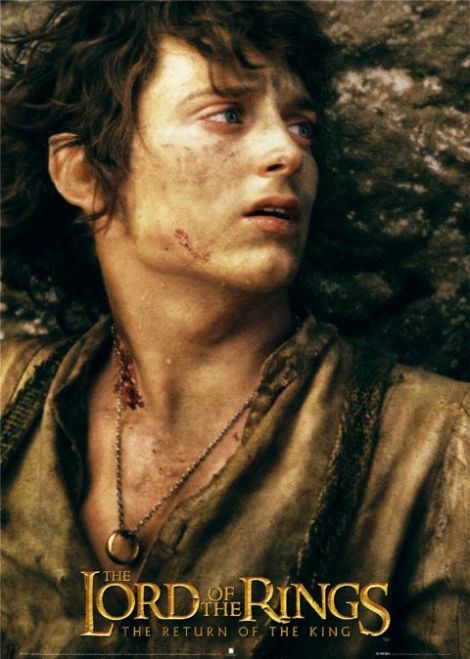
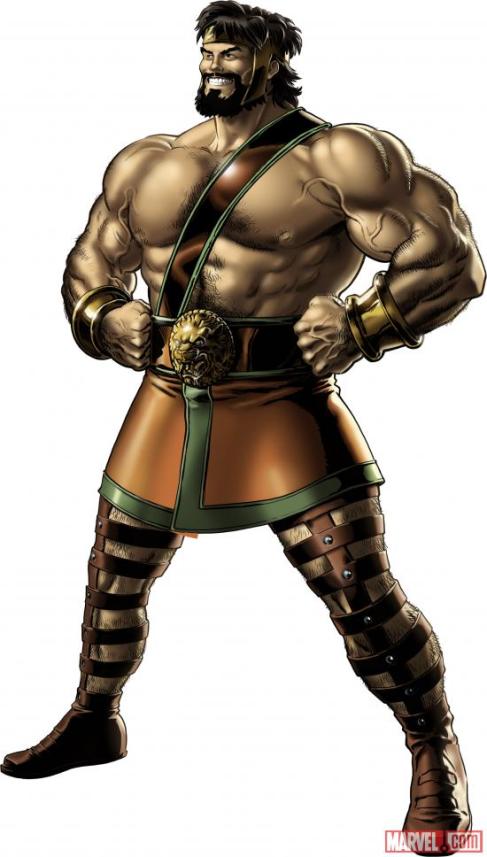
What's the difference between Hercules and Frodo? While one is super strong, embodying everything the Greeks idealized, the other is short, a little fat, neither strong nor particularly smart. Both are equally fictitious. Hercules killed his wife and went crazy but became a god, Frodo nearly gave in to temptation and got his fingers bitten off and then lived a quiet life. So who do we like better? The demigod, or the hobbit? The mythical hero or the everyday one? Although there is more action with the mythical hero and there is more room for creativity, we relate better to the everyday hero, because, let's face it, we don't have superpowers. Many wish we did, but if we can do something important without them, then we feel we have accomplished something. That's the reason superheroes have to have supervillains: if Superman only faced off against street thugs, it would get boring really fast (which is why I never felt Lex Luther was a great archnemesis to Superman: he didn't have any superpowers of his own, and didn't feel much like a threat).
So with Lord of the Rings, there are superheroes (Aragorn, Gandalf) and supervillains (Sauron, the Nazgul), but the real heroes are Frodo and Sam, who navigate through deadly Mordor with nothing but their wits and, more importantly, their perseverance. Getting a protagonist too powerful makes the story boring (which is why the Greeks threw in the tragedy of Hercules killing everyone and being hated by Hera, so there is something he doesn't have control over). Even in video games, where getting stronger over the course of a game is a staple of most genres, the last boss should be stronger than the player and has to be represent the greatest challenge. Basically, the greater the odds, the more interesting the story becomes. But there should be a balance, or it won't be very believable. If Frodo suddenly fought off all nine Nazgul before facing Sauron himself, all with Sting, his credibility as the everyday hero would be shot. Likewise, if he always escaped Sauron's notice through a series of incredibly lucky circumstances and plopped the ring into Mt Doom without breaking a sweat except from the heat of the volcano, readers will feel cheated, and his challenge would be lessened because it was so easy (I once saw a youtube video saying that he should have just jumped on one of the eagles and flown over to Mt Doom and dropped the ring in. Easy, but there would have been no story worth telling, now would there?) Each trial should be tailored to the hero, something he could believably overcome but the outcome would be in doubt, that he might not be able to overcome.The less luck, the less Deus ex Machina, the more doubt as to the outcome, the better.
But we don't just read about ordinary heroes. There is room for the Hercules, the Bruce Willis, the Luke Skywalker, and other powerful heroes. Oftentimes, they start out as normal, maybe having gone to the gym or taken martial arts beforehand, but still ordinary. But then they get thrown into a situation and their powers increase through training or they find some innate talent they didn't know they had (Harry Potter's magic, Luke's Force). We see them progress (although often in snippets where we know they are training but don't see the details. In movies, accompanied by an upbeat, encouraging soundtrack), know that they're not perfect, but they grow into their power. Even still, they should be the underdog. It's all relative, and we relate to relativity.
So is it better to write about heroes of mythic proportions, or to write about everyday heroes who are made by their reaction to a situation? It depends on what the story calls for, what could be believable, but they must always be human. In olden days, in serious works, there was usually the tragic flaw, often hubris or pride, that in the end caught up with the tragic hero and sealed his doom. Not everything ended happily ever after, but many stories were better for it (I prefer Shakespeare's tragedies to his comedies). The audience might put themselves in place of an everyday hero easier than a mythic one, but might get bored faster with him as well. So looking at the audience, the type of story, and how realistic it should guide an author what to choose. Oftentimes, it is someone in between. And as long as it is entertaining and doesn't strain credibility within the story, whatever is chosen is all right.
Reblogged from http://sageeyesblog.wordpress.com/wp-admin/post.php?post=1460&action=edit
Saturday, May 18, 2013
Romance and Fantasy part 2

A good romance within fantasy makes characters worth caring about, gives them more to lose if they fail in their journey, and provokes powerful emotions from the readers. But it can be hard. There are many that are over the top, and become unbelievable. Or too low key. There are characters where you wonder why they fall in love, and don't really have any chemistry, so it feels forced. Personally, I didn't care for the romances in Harry Potter. They felt a bit forced, so that everyone would be together and related in the end. Ginny didn't feel like she had much personality; she was just there so Ron and Harry could be brothers-in-law. Same thing with Hermione and Ron; I had no idea what she saw in him, although maybe from a female perspective it would be different, that she loved his humor or whatever. In the end, Harry, Ron, and Hermione stay together, but the romance elements didn't feel real to me. Also Edward and Bella in Twilight…from the perspective of a man, there's no reason why Edward should be so obsessed with her. She might be beautiful (although I don't find the emotionless Kristen Stewart all that attractive), but you'd think a hundred year old vampire would be able to judge beyond something so skin deep. She's a weak character and isn't very appealing to me, which is probably why many men don't like it, aside from being mushy. Another thing that happens in a lot of stories, including fantasy, is that the man (or boy) falls in love with a woman out of his reach, someone strong and independent maybe, and is pining for her, but eventually, they get together, and suddenly she becomes submissive and loses her personality, letting her new man do everything for her. People shouldn't lose what made them lovable in the first place once they hook up or get married.
Some authors seem to think that sex is the same as romance, that if they include descriptions of sex, it will make the readers fall in love with the characters. Some male authors use fantasy books to write porn (females as well, but often they write their own porn in romance novels). I feel that if the characters have sex, the reader doesn't really need to see it. Give them some privacy, even if they are fictional, unless it really has to do with the plot. We usually don't see the characters in the restroom; we don't need to see them in the bedroom. Graphic sex will probably turn off as many readers as it will attract, and the author's reputation will be damaged. So it should probably be left out. Both men and women are guilty of this.
Something else that often doesn't get shown is married love and romance. Often the characters are coming of age and at the end of the quest, they get married and the end, they lived happily ever after. Disney is partially responsible for this mentality. So many times, love is shown as good before marriage, but after being together, married people hate each other. A lot of sitcoms are based on this idea. But there are many things about romance that can be explored within marriage. It is different than young love, but not necessarily weaker, just not so full of drama. More stable. More enjoyable, really. If dating is a roller coaster, marriage is a road trip. Maybe not as exciting or scary, but at least you can hear each other talk, and there is still the anticipation of going somewhere together, that you're still on a journey.
In fantasy, love can be influenced by things that don't exist in real life. Love potions, spells that compel, magic that binds two souls together. Usually magic doesn't influence love itself, but can provide a counterfeit. True love can be what breaks curses and saves the day, like in Shrek. But despite what can be done in fantasy, love usually needs to be realistic for it to believable. Fortunately, love is the closest thing to magic in this life, so there is no real need to embellish it with magic to make it exciting. It already is.
There are several lists of good fantasy romances, mostly including female authors, as if men can't write romance. There is some bias in this, as woman are the ones judging. Like I said earlier, men write romance within a larger context of an adventure or other type of novel. If they were only to write romance fiction, they would probably be ridiculed and not have many sales. So beware, not all good romance comes from women, but can be hidden within other stories. Hopefully this post will get people thinking more critically about the romances presented. People want connection, want relationships, and reading about it can be rewarding, if done right. Here's to my wife, who's my fantasy and who taught me what real romance is. Thanks honey.
Reblogged from http://sageeyesblog.wordpress.com/2013/02/15/romance-and-fantasy-part-2/
Romance and Fantasy Part 1

Many times, when people see those words connected, they're not thinking of fantasy as swords and spells, but I'm not going to address that kind of fantasy today. Instead, I'm talking about love stories in a fantasy setting, with the swords and spells. And since Valentine's day has just passed, I thought it would be a good time to write on this. (I didn't write this before because I was spending time with my Valentine. By the way, I'm also coming out with a new short story soon.) So this subject is a big one, and i'll probably have more posts on it, but I wanted to get started.
Falling in love is often the closest we get to fantasy and magic in our real world lives, and having characters fall in love in stories either brings back good memories or gives us hope for a better future. Most people enjoy a good romantic tale, so it makes sense to include it in most stories (The Lord of the Rings is an exception, as it didn't really have any romance, although the movies inserted some in to draw more women.)
So one form of fantasy romance is the romance novel set in a fantasy setting, either modern or made up. Twilight is probably the most famous example of this, as vampires and werewolves are not real. This can also be called supernatural romance. These stories are aimed at female audiences and plays on their emotions, almost all from the female perspective. Men in these books are often sensitive chivalrous heroes that can read women much better than real men and are devoted to the female protagonist, sweeping them off their feet.
Another form of romance in fantasy is more from the male perspective. This is often more within an adventure, where the man has a woman he's fighting for, or someone he's fighting alongside with. Usually the protagonist is so heroic that the woman in his life has no choice but to throw herself at the hero's feet in worship, whether she's a damsel in distress or a heroine in her own right (which, sometimes when men are writing, the 'heroine' is no more than a man with breasts: in other words, acts like a man, is strong like a man, fights like a man, but has the body of a woman).
One of the biggest complaints, in both examples, is that the writer doesn't portray the opposite sex in a convincing and realistic way. Women write their idealized version of men, men write their idealized version of women; both end up writing someone of their own gender in the attractive body of the opposite gender.
But I don't want to go too much into gender right now. I just want to show that both genders have different viewpoints when it comes to romance, although both really want one thing: to love and be loved. Yes, women, most men are romantic and want to have love, not just sex. It hits us hard, but it's more taboo to talk about, especially to get emotional about it. Men don't usually read romance books because they are directed to female audiences and men can't relate. The same with chick flicks.
Reblogged from http://sageeyesblog.wordpress.com/2013/02/15/romance-and-fantasy-part-1
Friday, May 17, 2013
Hybrid Creatures
What do the following have in common?
Mermaid
Satyr
Centaur
Griffin
Hippogriff
Pegasus
Minotaur
Harpy
Sphinx
Lamia
Jackalope
Angel
Chimera
The title probably gave it away. One of the most common ways of creating a new creature, dating back to ancient times and myths, is to take two different creatures and combine them. Often, humans were one half of these equations. The Greeks in their mythology seemed especially apt at this. It is a lot harder to create something completely unique, so they took two things and created something new. Some are somewhat successful, like the centaur and mermaid, others like the satyr are somewhat superlative and lose their uniqueness (Since so many farm animals can be combined with humans, let's combine all of them with humans: half horse, half goat, half sheep, half pig, half chicken, half cow, half goat, half dog) The chimera, with a head of a lion, goat, eagle, and snake, and bat wings, all in one creature, is the extreme in ridiculousness. In a way, this is similar to creating creatures that are just big animals, like giant spiders. A bit lazy.
In worldbuilding, to create really interesting creatures, there can be recognizable elements from some real animals, but it should be more complex than the top half being one creature and the other half another. Some things to think about can be how a unique creature can adapt to its environment. If it is burning hot, its skin should somehow withstand the heat. Even using recognizable creatures, like elves and dwarves, can be tweaked to become unique. Do dwarves have excellent night vision, or are they blind like moles because they're underground all the time? Do elves twist in the air like cats to always land on their feet when falling from their trees? Are mermaids two different halves, or one whole where the top looks somewhat human and the bottom somewhat fishy? On griffins, is it completely covered in fur, or feathers, or both? Is there a creature that jumps like a frog, has a tail like a snake, skin like a crocodile, with horns like a ram, sees in heat signatures, and attacks with a jumping head butt?
Anyway, the point is that half things have been done to death and unless used in a new way, should probably be avoided. New ideas, perhaps built off of the old ones, expand the imagination. Since some of these creatures are so ridiculous or overused, many avoid them completely and just use humans for the drama, like George R. R. Martin (with the exception of the mysterious Others and three little dragons). The great thing about fantasy is that it can be as ridiculous or serious as you want.
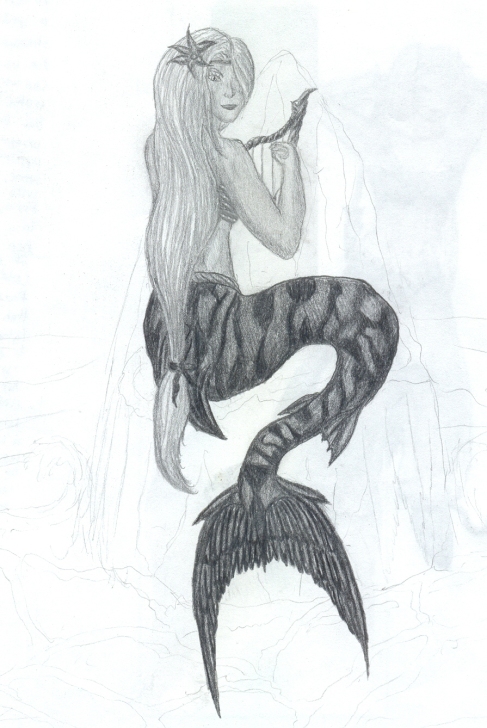
Reblogged from http://sageeyesblog.wordpress.com/2013/02/17/half-things/
Mermaid
Satyr
Centaur
Griffin
Hippogriff
Pegasus
Minotaur
Harpy
Sphinx
Lamia
Jackalope
Angel
Chimera
The title probably gave it away. One of the most common ways of creating a new creature, dating back to ancient times and myths, is to take two different creatures and combine them. Often, humans were one half of these equations. The Greeks in their mythology seemed especially apt at this. It is a lot harder to create something completely unique, so they took two things and created something new. Some are somewhat successful, like the centaur and mermaid, others like the satyr are somewhat superlative and lose their uniqueness (Since so many farm animals can be combined with humans, let's combine all of them with humans: half horse, half goat, half sheep, half pig, half chicken, half cow, half goat, half dog) The chimera, with a head of a lion, goat, eagle, and snake, and bat wings, all in one creature, is the extreme in ridiculousness. In a way, this is similar to creating creatures that are just big animals, like giant spiders. A bit lazy.
In worldbuilding, to create really interesting creatures, there can be recognizable elements from some real animals, but it should be more complex than the top half being one creature and the other half another. Some things to think about can be how a unique creature can adapt to its environment. If it is burning hot, its skin should somehow withstand the heat. Even using recognizable creatures, like elves and dwarves, can be tweaked to become unique. Do dwarves have excellent night vision, or are they blind like moles because they're underground all the time? Do elves twist in the air like cats to always land on their feet when falling from their trees? Are mermaids two different halves, or one whole where the top looks somewhat human and the bottom somewhat fishy? On griffins, is it completely covered in fur, or feathers, or both? Is there a creature that jumps like a frog, has a tail like a snake, skin like a crocodile, with horns like a ram, sees in heat signatures, and attacks with a jumping head butt?
Anyway, the point is that half things have been done to death and unless used in a new way, should probably be avoided. New ideas, perhaps built off of the old ones, expand the imagination. Since some of these creatures are so ridiculous or overused, many avoid them completely and just use humans for the drama, like George R. R. Martin (with the exception of the mysterious Others and three little dragons). The great thing about fantasy is that it can be as ridiculous or serious as you want.

Reblogged from http://sageeyesblog.wordpress.com/2013/02/17/half-things/
Immortality
We live in a temporary world. Nothing we do is permanent. When asked
to come up with a statement that would be all encompassing by an ancient
king, his counselors told him "This too shall pass." People live, die,
and are forgotten in time. Kingdoms thrive and then fall. Castles
erected, standing against thousands of soldiers, but are driven to the
ground by the wind and the rain. Even the earth will eventually be
swallowed up by the sun, which will burn out and be swallowed by a black
hole. People used to believe the universe had always existed, but were
ever searching for a beginning and an end, so scientists eventually came
up with the big bang theory, and are trying to figure out how it will
end, whether in a big drifting apart or a big recyclable crunch.
Everything that has a beginning has an end.
Faced with this pessimistic prospect, many story tellers try to counter it with tales of eternity and immortality. Tolkien's elves were immortal, only dying by the sword. The Greek gods were immortal, and sometimes were referred to by that name. Primal forces could be harnessed, and eternal magic used. Heroes left behind legacies that never would be forgotten. But even in these stories, immortality could never be comprehended. The elves retired to the west. The gods had enemies that threatened their rule, the titans. Magic is forgotten, as well as the legacy of a hero. Immortality is against nature, and so it is never taken to its full extent. In fact, most people would balk at immortality, fearing they would grow tired of it, while simultaneously fearing death and the end it brings.
Of course, religion goes into immortality as well, but from a different approach. It usually says our spirits, the intelligence within us, never dies, but once the body dies, goes to another plane, higher than this temporary universe. Heaven, where God, who always existed, lives. There, our minds would be unlocked and be able to comprehend immortality, eternity, and infinity. But here in mortality, these words have little meaning when people are dying every day, through war, murder, sickness, and age.
Fantasy and, to a smaller extent, science fiction, are the only media to explore immortals among us. If you're religious, immortality exists on another plane, like I said, and is separate from our everyday existence. Doesn't mean it doesn't exist, it just means its not something we experience in this life (unless an angel comes and talks to you). But elves (Tolkien's elves were actually based more on angels than Santa's helpers) and other magical races are roads to exploring the concept, as much as our minds will permit. How would it be to be immortal?
What is the price needed to pay for immortality? Normally, we assume that we wouldn't age, but one Greek myth has a man who wished for immortality get that gift, but without eternal youth, and he kept aging. Some witches suck the youth from pretty victims to keep from aging. Vampires kill humans and animals to keep enough blood to survive. Some make pacts with the devil, losing their immortal soul for immortality in the flesh (which usually turns against them in the end). Can science cure death? Sounds nice if it ever happens, but what about all the people who died before? I don't think science will ever be able to bring back people from the dead, especially those who died years and years ago.
If you have a group that lives forever, like the elves, how would the others, like the humans, react to them? Jealousy is probably a big factor. "How come they were born to live forever and not me? Why didn't I have elves for parents?" Even the half elves would be resentful that their immortal parent didn't hook up with another. People might kill elves just to show them they do have some mortality in them.
What do immortals do with their time? Would they ever get tired? Bored? Once they learn everything they can, what next? Or is their mind limited as well and they have to keep relearning things? What would they feel is their purpose in life? Many who are religious believe this life is a test and once done, we'll be judged and if good, go to heaven. Their purpose is to be good for that judgment. But if you never die? You have no heaven to look forward to. What did Bella and Edward do after having their one child in Twilight? They can't have anymore. Do they get sick of each other eventually? If scientists can extend the life of the body, can they extend the life of the mind, fundamentally changing it to accept unending sameness? Or would people go insane and commit suicide? Would immortals be lazy, or hard working?
Right now, death and immortality are hard subjects to contemplate, because we can't imagine living forever and ever, nor can we imagine ceasing to exist. If there is no God, then nature is cruel, giving us intelligence enough to contemplate our own end. If there is, then there is hope, but usually dependent on whether we were good or not. Hopefully God is merciful and won't condemn us to unending suffering. But I wouldn't take the chance, if I were you. In the immortal words of the giant gingerbread man in Shrek 2 as he laying dying in the moat:
Be good
Reblogged from http://sageeyesblog.wordpress.com/2013/02/05/immortality/
Faced with this pessimistic prospect, many story tellers try to counter it with tales of eternity and immortality. Tolkien's elves were immortal, only dying by the sword. The Greek gods were immortal, and sometimes were referred to by that name. Primal forces could be harnessed, and eternal magic used. Heroes left behind legacies that never would be forgotten. But even in these stories, immortality could never be comprehended. The elves retired to the west. The gods had enemies that threatened their rule, the titans. Magic is forgotten, as well as the legacy of a hero. Immortality is against nature, and so it is never taken to its full extent. In fact, most people would balk at immortality, fearing they would grow tired of it, while simultaneously fearing death and the end it brings.
Of course, religion goes into immortality as well, but from a different approach. It usually says our spirits, the intelligence within us, never dies, but once the body dies, goes to another plane, higher than this temporary universe. Heaven, where God, who always existed, lives. There, our minds would be unlocked and be able to comprehend immortality, eternity, and infinity. But here in mortality, these words have little meaning when people are dying every day, through war, murder, sickness, and age.
Fantasy and, to a smaller extent, science fiction, are the only media to explore immortals among us. If you're religious, immortality exists on another plane, like I said, and is separate from our everyday existence. Doesn't mean it doesn't exist, it just means its not something we experience in this life (unless an angel comes and talks to you). But elves (Tolkien's elves were actually based more on angels than Santa's helpers) and other magical races are roads to exploring the concept, as much as our minds will permit. How would it be to be immortal?
What is the price needed to pay for immortality? Normally, we assume that we wouldn't age, but one Greek myth has a man who wished for immortality get that gift, but without eternal youth, and he kept aging. Some witches suck the youth from pretty victims to keep from aging. Vampires kill humans and animals to keep enough blood to survive. Some make pacts with the devil, losing their immortal soul for immortality in the flesh (which usually turns against them in the end). Can science cure death? Sounds nice if it ever happens, but what about all the people who died before? I don't think science will ever be able to bring back people from the dead, especially those who died years and years ago.
If you have a group that lives forever, like the elves, how would the others, like the humans, react to them? Jealousy is probably a big factor. "How come they were born to live forever and not me? Why didn't I have elves for parents?" Even the half elves would be resentful that their immortal parent didn't hook up with another. People might kill elves just to show them they do have some mortality in them.
What do immortals do with their time? Would they ever get tired? Bored? Once they learn everything they can, what next? Or is their mind limited as well and they have to keep relearning things? What would they feel is their purpose in life? Many who are religious believe this life is a test and once done, we'll be judged and if good, go to heaven. Their purpose is to be good for that judgment. But if you never die? You have no heaven to look forward to. What did Bella and Edward do after having their one child in Twilight? They can't have anymore. Do they get sick of each other eventually? If scientists can extend the life of the body, can they extend the life of the mind, fundamentally changing it to accept unending sameness? Or would people go insane and commit suicide? Would immortals be lazy, or hard working?
Right now, death and immortality are hard subjects to contemplate, because we can't imagine living forever and ever, nor can we imagine ceasing to exist. If there is no God, then nature is cruel, giving us intelligence enough to contemplate our own end. If there is, then there is hope, but usually dependent on whether we were good or not. Hopefully God is merciful and won't condemn us to unending suffering. But I wouldn't take the chance, if I were you. In the immortal words of the giant gingerbread man in Shrek 2 as he laying dying in the moat:
Be good
Reblogged from http://sageeyesblog.wordpress.com/2013/02/05/immortality/
Final Fantasy Rankings
In the last post I talked a little about fantasy in video games, and
mentioned some series I liked when younger. One of the most well known
of these was probably Final Fantasy. So I thought I would post my own
rankings and thoughts on each one I played (I didn't play 11, 13, or
14). Yes, I know it might be a bit controversial, I've seen other
rankings, and everyone feels strongly about their favorite. Remember,
these are my opinions, not meant to offend. I enjoyed playing them all,
it is a good series, I finished each one (usually getting all the extras
as well). So if one is at the bottom, it doesn't mean I hate it, I just
don't like it as much as one at the top. So let's unveil the order:
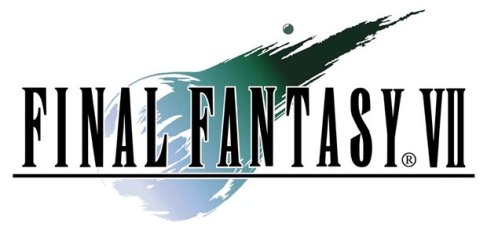
Final Fantasy 7
Overrated? Maybe. But it's still my favorite. The first one I played, it was also the one I played the most. I liked the characters, the story, the villain. It caught me up more than any other, even with ugly visuals at times. Yes, I cried when Aeris died. This game didn't need sequels, it needed an HD remake.
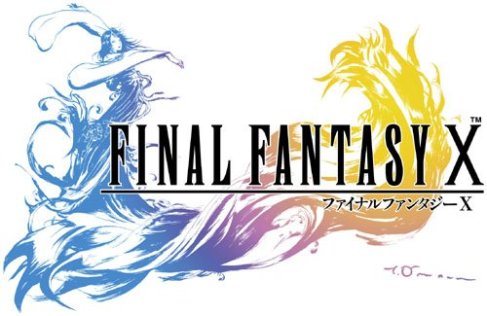
Final Fantasy 10
Like 7, I got caught up in the story of Tidus and Yuna and their pilgrimage. Plenty of emotions and twists. The amount of time you had to spend to get the ultimate weapons and other sidequests was a bit much, though and the sequel was a bit ridiculous.
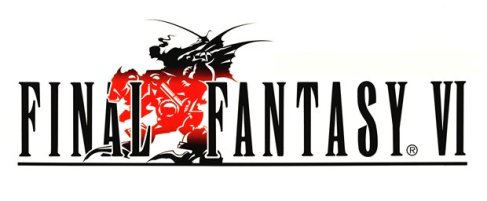
Final Fantasy 6
My favorite of the spite graphic games. It had a lot of characters, but they were interesting, and I wanted to punch Kefka in the face every time he laughed, that clown. The bonus movies included at the end of the Playstation version made me tear up.
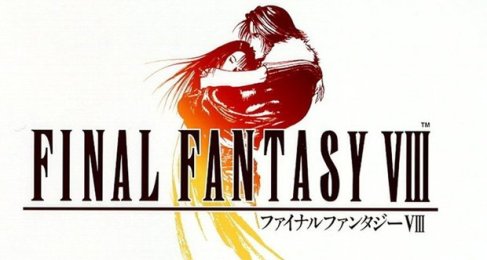
Final Fantasy 8
Despite Squall being an emo punk, there was a lot covered in this game and it was interesting. It had a more mature air than many Final Fantasies. There were also some strange plot twists that didn't really help, though. All from the same orphanage, evil witch from the future, frozen witch in space? The love story was both good and bad: When Rinoa and Squall are together, she annoys him. When apart or she's unconscious, he's obsessed with her. Romantic.
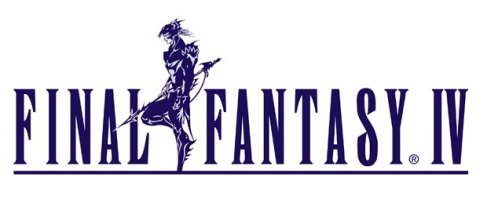
Final Fantasy 4
Don't really have a lot of strong feelings on this one. Some say it's their favorite, I say it's OK. Standard bad-guy-is-really-good-and/or-relative, but is possessed by evil force. But hey, you get to fly to the moon in a whale.
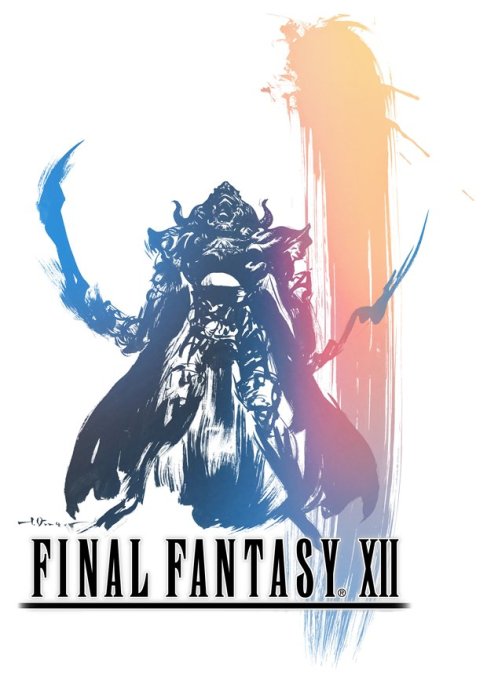
Final Fantasy 12
It had a good battle system, for the most part. Once you have a strategy, you can kind of sit back a relax instead of button mashing. With Yazmat, could leave the room and come back a while later. No more random battles, either! What I didn't really like was the plot. I wanted it to be good. Instead, it was: Meet bad guy. Get object A, find out it's useless. Get object B, find out it's useless as well. Run to heart of empire, then to other side of world. Get object C. Useless. Kill bad guy. Realize that main character had no reason to be included and the whole game would be the same if they took him out.
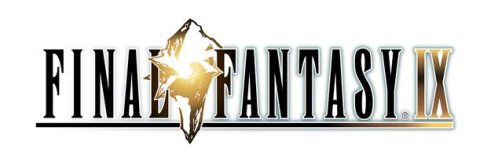
Final Fantasy 9
The main character's a monkey. Who later turns out to be all powerful. The main antagonist is a cross dresser (I seriously thought he was a she until half way through the game). CGM just for the princess cutting her hair. Last boss pops up, I was like, "Where the heck did you come from? You were never mentioned in the game until now." It was kind of depressing too, even with cartoon-like characters. The second time I played, I was a little more tolerant. But still didn't like it much.
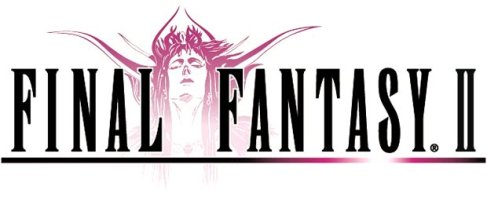
Final Fantasy 2
I don't remember this one really well, but I do remember it was an interesting game. At times it got repetitive, though (go for this spell, now this one). Magic was useless and weak. I was mad that I sold the sword midway through the game would make killing the last boss easy.
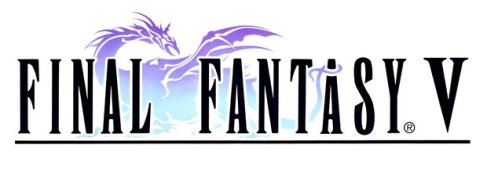
Final Fantasy 5
Couldn't really take this game seriously. Turtle! Bad guy named X-Death! But it was fun to make fun of. And to play with the jobs.
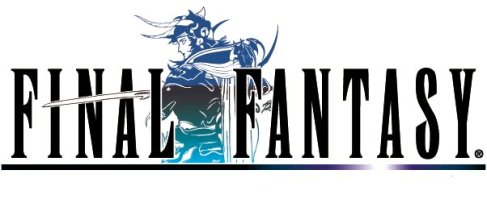
Final Fantasy 1
Not much of a story (Kill the first boss, find out that monsters are invading the land, you have to go back in time to find out the first boss had seen the future where you kill him, so he wants to kill you from the past by sending out those monsters. Yeah, I didn't get it either). But it was kind of fun in the fulfill-a-quest-to-open-an-area-you-were-wondering-about way.
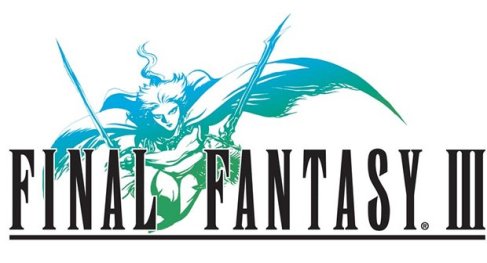
Final Fantasy 3
This one didn't have much of a story that I could remember, either. The jobs were kind of fun, though.
Reblogged from http://sageeyesblog.wordpress.com/2013/01/29/final-fantasy-rankings/

Final Fantasy 7
Overrated? Maybe. But it's still my favorite. The first one I played, it was also the one I played the most. I liked the characters, the story, the villain. It caught me up more than any other, even with ugly visuals at times. Yes, I cried when Aeris died. This game didn't need sequels, it needed an HD remake.

Final Fantasy 10
Like 7, I got caught up in the story of Tidus and Yuna and their pilgrimage. Plenty of emotions and twists. The amount of time you had to spend to get the ultimate weapons and other sidequests was a bit much, though and the sequel was a bit ridiculous.

Final Fantasy 6
My favorite of the spite graphic games. It had a lot of characters, but they were interesting, and I wanted to punch Kefka in the face every time he laughed, that clown. The bonus movies included at the end of the Playstation version made me tear up.

Final Fantasy 8
Despite Squall being an emo punk, there was a lot covered in this game and it was interesting. It had a more mature air than many Final Fantasies. There were also some strange plot twists that didn't really help, though. All from the same orphanage, evil witch from the future, frozen witch in space? The love story was both good and bad: When Rinoa and Squall are together, she annoys him. When apart or she's unconscious, he's obsessed with her. Romantic.

Final Fantasy 4
Don't really have a lot of strong feelings on this one. Some say it's their favorite, I say it's OK. Standard bad-guy-is-really-good-and/or-relative, but is possessed by evil force. But hey, you get to fly to the moon in a whale.

Final Fantasy 12
It had a good battle system, for the most part. Once you have a strategy, you can kind of sit back a relax instead of button mashing. With Yazmat, could leave the room and come back a while later. No more random battles, either! What I didn't really like was the plot. I wanted it to be good. Instead, it was: Meet bad guy. Get object A, find out it's useless. Get object B, find out it's useless as well. Run to heart of empire, then to other side of world. Get object C. Useless. Kill bad guy. Realize that main character had no reason to be included and the whole game would be the same if they took him out.

Final Fantasy 9
The main character's a monkey. Who later turns out to be all powerful. The main antagonist is a cross dresser (I seriously thought he was a she until half way through the game). CGM just for the princess cutting her hair. Last boss pops up, I was like, "Where the heck did you come from? You were never mentioned in the game until now." It was kind of depressing too, even with cartoon-like characters. The second time I played, I was a little more tolerant. But still didn't like it much.

Final Fantasy 2
I don't remember this one really well, but I do remember it was an interesting game. At times it got repetitive, though (go for this spell, now this one). Magic was useless and weak. I was mad that I sold the sword midway through the game would make killing the last boss easy.

Final Fantasy 5
Couldn't really take this game seriously. Turtle! Bad guy named X-Death! But it was fun to make fun of. And to play with the jobs.

Final Fantasy 1
Not much of a story (Kill the first boss, find out that monsters are invading the land, you have to go back in time to find out the first boss had seen the future where you kill him, so he wants to kill you from the past by sending out those monsters. Yeah, I didn't get it either). But it was kind of fun in the fulfill-a-quest-to-open-an-area-you-were-wondering-about way.

Final Fantasy 3
This one didn't have much of a story that I could remember, either. The jobs were kind of fun, though.
Reblogged from http://sageeyesblog.wordpress.com/2013/01/29/final-fantasy-rankings/
Fantasy in Video Games
Up till now, I have mostly been focusing on fantasy within books.
While that is probably where it is the biggest, there are other media
that handle the fantasy genre. Movies, television, and video games all
do it well, some better than others. For example, with movies, you won't
find much of magic and wizards outside of the Lord of the Rings movies
and Harry Potter, both of which were extremely successful, so maybe the
movie industry will start taking the genre more seriously. On
television, there are series like Once Upon a Time and Merlin. But
outside of books, the biggest place for fantasy is probably in video
games, which makes sense. It is one thing to read about sword fights and
wizard duels. It is another to experience them in video games. The RPG
(role playing game) is probably the biggest that supports fantasy, but
there are others as well. Strategy games, adventure games, online games.
In this post, I am going to go over a few series of games that shaped
my youth.
Final Fantasy
Square Enix
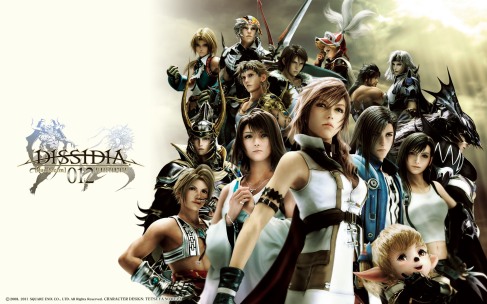
This series has come to represent the Japanese RPG, a way of doing RPG games that often involve turn based battles and heavy characterization. There are fourteen entries, plus spinoffs and sequels. Every entry is a unique world with unique characters. Often, they mix technology and fantasy in interesting ways. What they don't do is let you create your character and make game changing choices (except in the online versions, 11 and 14). So you pretty much have to follow the script, but in some ways that's better, because it allows the makers to create a story that is more interesting that way. There are memorable characters (Cloud, Sephiroth) and beautiful graphics, at least in the later entries. Final Fantasy 7 is the most famous, and one of the best rated.
Warcraft
Blizzard
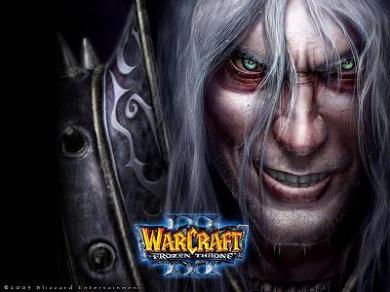
Warcraft is a RTS (real time strategy) game, where build up cities, recruit troops, and lead the to war. Originally it was human versus orc, later they added undead and night elves in. It was easy to spend hours on building up an army, and multiplayer was tense. Then Blizzard came up with World of Warcraft, which grew to be the biggest massively multiplayer role playing game in the world, and they left behind the strategy part of Warcraft. I don't play, since it costs a monthly fee and I don't want to be addicted like some people end up being, but I heard it is fun.
Heroes of Might and Magic
Ubisoft
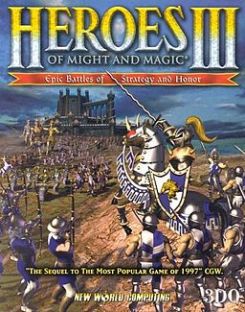
This game is also a strategy game where you lead mythical creatures to war, but this one is turn based and the battlefield is set up like a chess board. I actually enjoyed it more, as you had a little bit of time to think, unlike warcraft, and there were more types of creatures, from titans to dragons to centaurs to phoenix. I spent a long time playing this one. The latest versions haven't been as fun to play, though.
Zelda
Nintendo
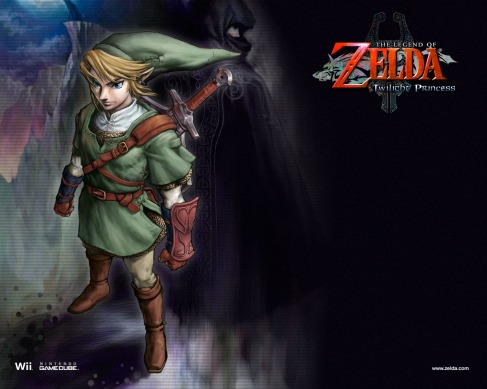
This series deals with solving puzzles and fighting with a sword. It is in real time, with just one character you're controlling, Link. It can really force you to use your mind and the items you collect. The latest one used the motion controller of the Wii to its fullest extent. A really fun series.
Reblogged from http://sageeyesblog.wordpress.com/2013/01/28/fantasy-in-video-games/
Final Fantasy
Square Enix

This series has come to represent the Japanese RPG, a way of doing RPG games that often involve turn based battles and heavy characterization. There are fourteen entries, plus spinoffs and sequels. Every entry is a unique world with unique characters. Often, they mix technology and fantasy in interesting ways. What they don't do is let you create your character and make game changing choices (except in the online versions, 11 and 14). So you pretty much have to follow the script, but in some ways that's better, because it allows the makers to create a story that is more interesting that way. There are memorable characters (Cloud, Sephiroth) and beautiful graphics, at least in the later entries. Final Fantasy 7 is the most famous, and one of the best rated.
Warcraft
Blizzard

Warcraft is a RTS (real time strategy) game, where build up cities, recruit troops, and lead the to war. Originally it was human versus orc, later they added undead and night elves in. It was easy to spend hours on building up an army, and multiplayer was tense. Then Blizzard came up with World of Warcraft, which grew to be the biggest massively multiplayer role playing game in the world, and they left behind the strategy part of Warcraft. I don't play, since it costs a monthly fee and I don't want to be addicted like some people end up being, but I heard it is fun.
Heroes of Might and Magic
Ubisoft

This game is also a strategy game where you lead mythical creatures to war, but this one is turn based and the battlefield is set up like a chess board. I actually enjoyed it more, as you had a little bit of time to think, unlike warcraft, and there were more types of creatures, from titans to dragons to centaurs to phoenix. I spent a long time playing this one. The latest versions haven't been as fun to play, though.
Zelda
Nintendo

This series deals with solving puzzles and fighting with a sword. It is in real time, with just one character you're controlling, Link. It can really force you to use your mind and the items you collect. The latest one used the motion controller of the Wii to its fullest extent. A really fun series.
Reblogged from http://sageeyesblog.wordpress.com/2013/01/28/fantasy-in-video-games/
Devils
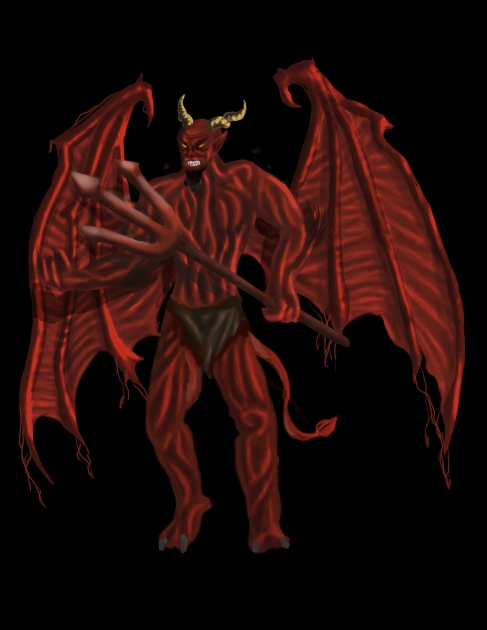
Devils and demons often play an antagonistic role in fantasy. They take on many different forms and come about in so many different ways. Some are malevolent spirits, others are creatures summoned from another realm, others come from the ground and have nightmarish bodies. All seem to be evil or at least neutral, and are often dangerous when summoned, kept barely under control, if controlled at all.
The concept is mostly associated with Christianity, where the devil, Satan or Lucifer, is a fallen angel opposing God's plan, and trying to lead men to hell. Some say he is the master there, others that he just wants people to be miserable with him. Some say he works alone, others with his demon minions. Most other religions have a devil or some other sort of adversary as well, although now people seem to want to focus on goodness and leave the devil out of it, ignoring him or not believing in one.
The image of the devil came in the middle ages, when priests thought that their followers were not scared enough by the devil, so they made an image meant to frighten people into righteousness. The devil had horns on his head, hooves like a goat, claws, and a tail. Kind of like a satyr, but red. Sometimes they gave him batwings. He used a pitchfork as his weapon. Other demons had similar characteristics. Usually ugly, they might also be beautiful, to seduce you.
Usually in books, these devils or demons don't look like the classical description. The most common is the spirit, since that is what devils are, if they exist (you don't see demons walking around, at least not how they are shown in pictures. People you know, however, like your in-laws if you're unlucky, might be personal demons for you). Sometimes they will possess bodies, a common idea in fantasy.
In games, sometimes they will be shown in a physical form. In Heroes of Might and Magic 6, the demon faction has 7 creatures, each representing one of the deadly sins. In literature, they represent the dark side of humanity, the nightmares, the fears, the depraved acts humans can commit. In this way, Pandora of mythology was the mother of all demons. They also often represent fire, or are represented by it, which, with Prometheus, acted the same way as the forbidden fruit of Adam and Eve: it brought knowledge to humans and the ability to act for themselves, separating them from animals. This knowledge burned with the pains of sin and the light of knowledge.
Since they are rarely, if ever, the good guys, they are a bit more one dimensional than other fantasy creatures. Because of this, and because people are more uncomfortable with religion, they are less and less common as characters. If thinking about using demons, be aware of what they represent and if they go long with the story, and use them in a creative way.
Reblogged from http://sageeyesblog.wordpress.com/2013/01/30/devils/
Thursday, May 16, 2013
Heroics
"My liege, Prince Filmor, we hate to bear bad news, but we have just
received word that the Lady Arabella has been abducted in route to the
city."
Brom straightened up on his seat, situated by his father's throne, empty as usual. This was the first tiding in days that had interested him. In fact, he had been caught up in a daydream about his future wife. He had only met her once, but that had been enough to leave him smitten. Declared one of the beauties of the land, Arabella's smile, so timid but so knowing at the same time, enchanted him. His thoughts had wandered to the wedding night when the unfortunate news came.
"Arabella!" he said, rising from his seat and whisking his cape in back of him. "Something must be done. Who kidnapped her? Where were they heading?"
"To the west," one of the quivering messengers said, kneeling at his feet. The man was scrawny, unlike Brom's own physique.
What lay to the west? "Jadek," he said, that one name taking on power.
"It would seem the logical conclusion," one of his advisors, Hadrian, said. "What course of action would you suggest in the absence of your father? Diplomacy? Espionage?"
"Action," Brom said, ignoring the messengers kneeling uncomfortably on the hard floor. "There will be no tolerance for such an audacious act. Prepare the military."
"My prince, I would advise against such drastic terms. We have a trade agreement with the Thromwells, and marching an army into their territory would be an egregious break of trust." Hadrian, with his balding head, furrowed his brows, making him look more ancient than his forty years.
Brom remembered the messengers, waiting to be addressed, and waved them away. Most of them left, but one stayed near, half bowing, looking hesitant. Brom waved him away more energetically; annoyed he had to waste so much energy on the man. The messenger smiled and left, running after his coworkers. Hadrian and Brom were alone now.
"Any treaty Jadek Thromwell had with us is null in light of this kidnapping."
"But Brom, you have no idea it was Jadek in the first place."
"I saw how he was looking at her in the feast. Father Morander would be ashamed to have someone so full of lust attending the event in his memory."
"Perhaps, but I know your father was ashamed to have his son drooling after the same girl."
"I was not drooling. Anyway, I saw how much he wanted to have her for his own, and how jealous he was of me when my father announced our betrothal."
Hadrian sighed. "You are the regent while your father is gone, and you have every right to be concerned about the welfare of your future wife, but remember that I recommended against it. Only you will answer to your father when this is over."
"And receive all the praise," Brom said. "Really, this won't even be an issue. Don't fret, I will cast you in the best light possible."
"As you will, my prince. I desire the best for your journey. I will notify the general of your decision. But please, do not make enemies lightly."
"There is nothing to fear," Brom said, fearing he would be the same when he was older. "The princess will return safely and we will soon be wed."
"Assemble the men," Brom ordered from his horse. The flag bearer raised the horn and blew. Brom felt the vibrations pulsing as they reverberated through the valley. His men offered up a cheer as the march began. He smiled down on them as a loving father would. He yelled out as loud as he could, hoping his thousand men could hear him. "Your future queen, Arabella, has been kidnapped. We must rescue her. We believe she is held captive in Melfor with the Thromwells. Once we arrive, leave no house, no store, no alley unsearched." Thinking about Hadrian, he said, "Avoid violence, but use it as necessary. And do whatever is required to save the princess's life."
The city of Melfor stretched before them, vast as the clouds in the sky. In the distance stood Thromwell castle, where Brom was sure he would find Arabella. In case Jadek, the elder son who recently inherited the throne after his father died of the yellow fever, saw Brom coming and sent Arabella away into the city, he would have his men enter in and search every house. Luckily, most of Jadek's men were with Brom's father, fighting in the alliance against the usurpation of the Kingdom of Grim by the Mithics.
They made it to the gates of the town before getting any response. One of Jadek's guards came out to meet them, dressed in violet finery, but looking annoyed. "What is the meaning of this, Prince Brom? Just because your father didn't bring as many troops with him to war as we did doesn't give you the right to trample into our fair city."
"You know why we're here. And do not insult my father, who is actually fighting, unlike Jadek."
"As well as you," the guard replied, sneering.
"Someone needs to run the kingdom!" Brom said, losing patience.
"Exactly."
"What is your name?"
"I am called Firion, son of-"
"Firion, if you can't give me Arabella right now, I am going to take over this city and burn down every house until I find her."
"Arabella? Who is she?" There was a look of such confusion on the man's face that for a moment Brom thought he might not know. Only for a moment, though.
"Put up your guard, because I am going to rescue her!" Brom charged Firion with his sword raised. Firion barely had time to take out his sword and block the strike which left him trembling.
"You're mad!"
"That's right!"
One of the men escorting Firion backed away and pulled out a horn. It took him a few tries, but it sounded throughout the city, while Firion and Brom fought. Brom's army marched forward, ready to take on the opposing host.
Brom had to admit, the guard was a good swordsman, but that was no surprise, given his position. Still, Brom was bigger and used his brute force to his advantage. His troops marched past him.
Swords clashed, ringing nearly as loud as the horn. Thrust, side slash, feint, parry, thrust again. Brom pressed down, hoping to break Firion's stance. When that didn't work, he slid down and slid his foot in an arc, trying to trip him, but only managing to unbalance him.
So he jumped on him.
Firion fell down, Brom on top. Not about to take any chances, Brom plunged the sword into Firion's chest, pushing through the armor. Firion just gurgled in surprise, eyes already going blank.
Taking his sword out, blood dripping, he stood up and shook it before wiping it on Firion's clothes. Red specks covered the ground.
Inside the city, people were running out of their houses, screaming. This only encouraged Brom's army to chase after, pillaging and plundering. Brom hadn't meant for this to happen, but getting control of them now would be nearly impossible, and he had to get to Castle Thromwell. Taking a unit of disciplined soldiers, he left orders with the general to round up the army and he took off.
A few peasants tried to stand up to him, yelling, calling him names, but he just cut them down. The castle stood like a white beacon, and everything else in sight was just a distraction. Arabella was waiting for him.
Within fifteen minutes, he arrived at the gates. With the help of some of his guards, after dispatching Jadek's, he pushed open the doors in a dramatic gesture. Light from the cloudy sky filled the hall. His footsteps echoed all around him.
Going in deeper, dispatching more guards, Brom entered the hall to confront Jadek. He wanted Arabella, and no one would stop him. Clenching his sword until it hurt, as well as his teeth, he scanned the dark room. At the back facing him was his nemesis.
"You have broken the treaty, Brom," came the voice from the shadows. Brom's vision adjusted to the darkness. Jadek looked like he wanted to jump out of his throne and strangle him. Brom almost wanted him to try.
"The treaty was meaningless once you kidnapped my wife," Brom said with deadly calm.
Jadek looked incredulous. "That is what this is about? You pillage my city for a girl?"
"You brought this upon yourself. Now where is she? Locked away?"
"I'm right here," Arabella said, coming out of the shadows to the right of Jadek. Lush golden hair, delicate face, cherry lips, swaying hips. Brom lost his breath. "You should have left us."
"Let her go free!" Bloodlust threatened to take over Brom.
"I want to be with him, Prince Brom!" Arabella yelled, becoming even more beautiful. "I never wanted to be with you!"
Brom couldn't believe what he was hearing. She was to be his wife. She couldn't hate him. He had done so much for her. No, this was a mistake. She had been manipulated. This wasn't her talking. He knew it. She would never say something like that in her right mind. Jadek had some leverage on her.
"What have you done to her?" Brom cried out. "Face me now!"
"You're insane!" Jadek yelled. "Guards, stop him."
Thus began the battle, Brom's guards versus Jadek's. Brom helped, giving the advantage to his side. The fight lasted several minutes, and Jadek escaped with Arabella, but Brom couldn't get through. His own side suffered several losses before he disabled the last of them.
As soon as possible, he took off after Jadek and Arabella. He wasn't sure where they had gone, but could guess. The castle wasn't unfamiliar to him. Because Arabella wore heels, she slowed them down, and Brom found them trying to escape in the back entrance.
"Jadek, it's over."
"Why are you doing this, Prince Brom? What did I ever do to you?"
"You took my wife."
"She's not your wife yet, and she came to me. We love each other; she didn't want to get married to someone she couldn't love. Will you not allow us happiness?"
Brom sheathed his sword, breathing hard. He walked up to Jadek, each step a battle. Glancing at Arabella with regret, he held out his hand. Jadek took it, hesitantly.
Grabbing onto his hand, Brom took out his sword with the other and impaled Jadek, pulling him closer. Arabella screamed and ran to Brom, hitting him with her fists. Brom ignored her. Jadek's eyes grew lifeless and he coughed blood.
Brom pulled out the sword and let Jadek drop to the ground. Tired of hitting him, Arabella dropped to the ground as well, putting her body over his and crying. Brom left them, sighing.
A month later, they were married. Brom was crowned prince of Thromwell as well, ruling in absence of his father. Arabella promised she would hate him forever, and did not let him in her rooms ever, not even on their wedding night. He didn't have the will to argue.
A few days later Brom was on the throne in a pose of deep and sad contemplation. Trumpets started blaring, shaking him from his mental fantasy. The doors opened and in strode a regal figure. someone with a purpose. It reminded Brom of himself so recently, coming in on Jadek.
"Father," he said simply.
"Brom Filmor," his father, Reginald, said. Although he said it pleasantly enough, undercurrents of anger were manifest. "I have come for an accounting of the stewardship I left you."
"Leave us," Brom ordered everyone in his court.
"Let Hadrian stay," Reginald said. "I do not wish to be completely alone with you."
Hadrian stayed, but did not look pleased.
"Well?"
Brom sighed. "Hadrian, if you please."
"Remember your promise, my prince," Hadrian began.
"Yes, yes," Brom said, waving his hand and turning around. He clasped his hands behind his back. "Hadrian counseled me against all of this, and I didn't listen."
Reginald stayed silent, but put his chin in his hand. Hadrian cleared his voice and began the report. "There was an…altercation. It ended up in a battle between Thromwell and Filmor. In the end, we lost two hundred and twenty three soldiers. Thromwell lost many more, mostly civilians of fighting age. Also, Jadek, king of Thromwell, was killed. Without heirs, and in the confusion, Brom declared himself king of Thromwell."
"Prince," said Reginald, signaling Hadrian to continue.
"Prince Brom took Lady Arabella Faus as wife, and they were married three days ago. I have nothing more to report."
"Very succinct," Reginald said. "Thank you for the report, Hadrian."
"Thank you, majesty," Hadrian said, bowing. "If I may be so bold, how fared the war with the Mithics?"
"Let me put it this way. After the heroics of my son, now with so few soldiers to call upon for reinforcements, you need not call me majesty much longer."
"You lost?" Brom shouted, then remembered himself. "Father?"
"We had to resort to the defensive. The Mithics will be coming to invade soon. I had hoped to recruit from Filmor and Thromwell to put together one last defense of our kingdoms, but with the needless losses you caused, I don't know if it will be enough. Plus, we cannot count on the morale of Thromwell's troops, now. They might prefer Mithic rule to our own."
"I'm sorry, father!"
Reginald took a step forward, his anger finally showing. "Is that all you can say? Sorry? You destroyed the kingdom while I was gone! All you had to do was nothing! Was that so hard?"
"I didn't want Jadek to steal Arabella away!"
"Oh? And how did that work out? How's the marriage?" Brom didn't answer for a few minutes. "Hmm?"
"You obviously know, so don't taunt me!"
They stared at each other. Reginald finally spoke up. "Hopefully the Mithics will allow our family to continue ruling under them. Even though it's unlikely you'll be producing heirs anytime soon. I hope you enjoyed being the hero, son. You conquered a kingdom, now we will be conquered. We need great leadership in this time of change. Which means no more heroics."
Brom straightened up on his seat, situated by his father's throne, empty as usual. This was the first tiding in days that had interested him. In fact, he had been caught up in a daydream about his future wife. He had only met her once, but that had been enough to leave him smitten. Declared one of the beauties of the land, Arabella's smile, so timid but so knowing at the same time, enchanted him. His thoughts had wandered to the wedding night when the unfortunate news came.
"Arabella!" he said, rising from his seat and whisking his cape in back of him. "Something must be done. Who kidnapped her? Where were they heading?"
"To the west," one of the quivering messengers said, kneeling at his feet. The man was scrawny, unlike Brom's own physique.
What lay to the west? "Jadek," he said, that one name taking on power.
"It would seem the logical conclusion," one of his advisors, Hadrian, said. "What course of action would you suggest in the absence of your father? Diplomacy? Espionage?"
"Action," Brom said, ignoring the messengers kneeling uncomfortably on the hard floor. "There will be no tolerance for such an audacious act. Prepare the military."
"My prince, I would advise against such drastic terms. We have a trade agreement with the Thromwells, and marching an army into their territory would be an egregious break of trust." Hadrian, with his balding head, furrowed his brows, making him look more ancient than his forty years.
Brom remembered the messengers, waiting to be addressed, and waved them away. Most of them left, but one stayed near, half bowing, looking hesitant. Brom waved him away more energetically; annoyed he had to waste so much energy on the man. The messenger smiled and left, running after his coworkers. Hadrian and Brom were alone now.
"Any treaty Jadek Thromwell had with us is null in light of this kidnapping."
"But Brom, you have no idea it was Jadek in the first place."
"I saw how he was looking at her in the feast. Father Morander would be ashamed to have someone so full of lust attending the event in his memory."
"Perhaps, but I know your father was ashamed to have his son drooling after the same girl."
"I was not drooling. Anyway, I saw how much he wanted to have her for his own, and how jealous he was of me when my father announced our betrothal."
Hadrian sighed. "You are the regent while your father is gone, and you have every right to be concerned about the welfare of your future wife, but remember that I recommended against it. Only you will answer to your father when this is over."
"And receive all the praise," Brom said. "Really, this won't even be an issue. Don't fret, I will cast you in the best light possible."
"As you will, my prince. I desire the best for your journey. I will notify the general of your decision. But please, do not make enemies lightly."
"There is nothing to fear," Brom said, fearing he would be the same when he was older. "The princess will return safely and we will soon be wed."
"Assemble the men," Brom ordered from his horse. The flag bearer raised the horn and blew. Brom felt the vibrations pulsing as they reverberated through the valley. His men offered up a cheer as the march began. He smiled down on them as a loving father would. He yelled out as loud as he could, hoping his thousand men could hear him. "Your future queen, Arabella, has been kidnapped. We must rescue her. We believe she is held captive in Melfor with the Thromwells. Once we arrive, leave no house, no store, no alley unsearched." Thinking about Hadrian, he said, "Avoid violence, but use it as necessary. And do whatever is required to save the princess's life."
The city of Melfor stretched before them, vast as the clouds in the sky. In the distance stood Thromwell castle, where Brom was sure he would find Arabella. In case Jadek, the elder son who recently inherited the throne after his father died of the yellow fever, saw Brom coming and sent Arabella away into the city, he would have his men enter in and search every house. Luckily, most of Jadek's men were with Brom's father, fighting in the alliance against the usurpation of the Kingdom of Grim by the Mithics.
They made it to the gates of the town before getting any response. One of Jadek's guards came out to meet them, dressed in violet finery, but looking annoyed. "What is the meaning of this, Prince Brom? Just because your father didn't bring as many troops with him to war as we did doesn't give you the right to trample into our fair city."
"You know why we're here. And do not insult my father, who is actually fighting, unlike Jadek."
"As well as you," the guard replied, sneering.
"Someone needs to run the kingdom!" Brom said, losing patience.
"Exactly."
"What is your name?"
"I am called Firion, son of-"
"Firion, if you can't give me Arabella right now, I am going to take over this city and burn down every house until I find her."
"Arabella? Who is she?" There was a look of such confusion on the man's face that for a moment Brom thought he might not know. Only for a moment, though.
"Put up your guard, because I am going to rescue her!" Brom charged Firion with his sword raised. Firion barely had time to take out his sword and block the strike which left him trembling.
"You're mad!"
"That's right!"
One of the men escorting Firion backed away and pulled out a horn. It took him a few tries, but it sounded throughout the city, while Firion and Brom fought. Brom's army marched forward, ready to take on the opposing host.
Brom had to admit, the guard was a good swordsman, but that was no surprise, given his position. Still, Brom was bigger and used his brute force to his advantage. His troops marched past him.
Swords clashed, ringing nearly as loud as the horn. Thrust, side slash, feint, parry, thrust again. Brom pressed down, hoping to break Firion's stance. When that didn't work, he slid down and slid his foot in an arc, trying to trip him, but only managing to unbalance him.
So he jumped on him.
Firion fell down, Brom on top. Not about to take any chances, Brom plunged the sword into Firion's chest, pushing through the armor. Firion just gurgled in surprise, eyes already going blank.
Taking his sword out, blood dripping, he stood up and shook it before wiping it on Firion's clothes. Red specks covered the ground.
Inside the city, people were running out of their houses, screaming. This only encouraged Brom's army to chase after, pillaging and plundering. Brom hadn't meant for this to happen, but getting control of them now would be nearly impossible, and he had to get to Castle Thromwell. Taking a unit of disciplined soldiers, he left orders with the general to round up the army and he took off.
A few peasants tried to stand up to him, yelling, calling him names, but he just cut them down. The castle stood like a white beacon, and everything else in sight was just a distraction. Arabella was waiting for him.
Within fifteen minutes, he arrived at the gates. With the help of some of his guards, after dispatching Jadek's, he pushed open the doors in a dramatic gesture. Light from the cloudy sky filled the hall. His footsteps echoed all around him.
Going in deeper, dispatching more guards, Brom entered the hall to confront Jadek. He wanted Arabella, and no one would stop him. Clenching his sword until it hurt, as well as his teeth, he scanned the dark room. At the back facing him was his nemesis.
"You have broken the treaty, Brom," came the voice from the shadows. Brom's vision adjusted to the darkness. Jadek looked like he wanted to jump out of his throne and strangle him. Brom almost wanted him to try.
"The treaty was meaningless once you kidnapped my wife," Brom said with deadly calm.
Jadek looked incredulous. "That is what this is about? You pillage my city for a girl?"
"You brought this upon yourself. Now where is she? Locked away?"
"I'm right here," Arabella said, coming out of the shadows to the right of Jadek. Lush golden hair, delicate face, cherry lips, swaying hips. Brom lost his breath. "You should have left us."
"Let her go free!" Bloodlust threatened to take over Brom.
"I want to be with him, Prince Brom!" Arabella yelled, becoming even more beautiful. "I never wanted to be with you!"
Brom couldn't believe what he was hearing. She was to be his wife. She couldn't hate him. He had done so much for her. No, this was a mistake. She had been manipulated. This wasn't her talking. He knew it. She would never say something like that in her right mind. Jadek had some leverage on her.
"What have you done to her?" Brom cried out. "Face me now!"
"You're insane!" Jadek yelled. "Guards, stop him."
Thus began the battle, Brom's guards versus Jadek's. Brom helped, giving the advantage to his side. The fight lasted several minutes, and Jadek escaped with Arabella, but Brom couldn't get through. His own side suffered several losses before he disabled the last of them.
As soon as possible, he took off after Jadek and Arabella. He wasn't sure where they had gone, but could guess. The castle wasn't unfamiliar to him. Because Arabella wore heels, she slowed them down, and Brom found them trying to escape in the back entrance.
"Jadek, it's over."
"Why are you doing this, Prince Brom? What did I ever do to you?"
"You took my wife."
"She's not your wife yet, and she came to me. We love each other; she didn't want to get married to someone she couldn't love. Will you not allow us happiness?"
Brom sheathed his sword, breathing hard. He walked up to Jadek, each step a battle. Glancing at Arabella with regret, he held out his hand. Jadek took it, hesitantly.
Grabbing onto his hand, Brom took out his sword with the other and impaled Jadek, pulling him closer. Arabella screamed and ran to Brom, hitting him with her fists. Brom ignored her. Jadek's eyes grew lifeless and he coughed blood.
Brom pulled out the sword and let Jadek drop to the ground. Tired of hitting him, Arabella dropped to the ground as well, putting her body over his and crying. Brom left them, sighing.
A month later, they were married. Brom was crowned prince of Thromwell as well, ruling in absence of his father. Arabella promised she would hate him forever, and did not let him in her rooms ever, not even on their wedding night. He didn't have the will to argue.
A few days later Brom was on the throne in a pose of deep and sad contemplation. Trumpets started blaring, shaking him from his mental fantasy. The doors opened and in strode a regal figure. someone with a purpose. It reminded Brom of himself so recently, coming in on Jadek.
"Father," he said simply.
"Brom Filmor," his father, Reginald, said. Although he said it pleasantly enough, undercurrents of anger were manifest. "I have come for an accounting of the stewardship I left you."
"Leave us," Brom ordered everyone in his court.
"Let Hadrian stay," Reginald said. "I do not wish to be completely alone with you."
Hadrian stayed, but did not look pleased.
"Well?"
Brom sighed. "Hadrian, if you please."
"Remember your promise, my prince," Hadrian began.
"Yes, yes," Brom said, waving his hand and turning around. He clasped his hands behind his back. "Hadrian counseled me against all of this, and I didn't listen."
Reginald stayed silent, but put his chin in his hand. Hadrian cleared his voice and began the report. "There was an…altercation. It ended up in a battle between Thromwell and Filmor. In the end, we lost two hundred and twenty three soldiers. Thromwell lost many more, mostly civilians of fighting age. Also, Jadek, king of Thromwell, was killed. Without heirs, and in the confusion, Brom declared himself king of Thromwell."
"Prince," said Reginald, signaling Hadrian to continue.
"Prince Brom took Lady Arabella Faus as wife, and they were married three days ago. I have nothing more to report."
"Very succinct," Reginald said. "Thank you for the report, Hadrian."
"Thank you, majesty," Hadrian said, bowing. "If I may be so bold, how fared the war with the Mithics?"
"Let me put it this way. After the heroics of my son, now with so few soldiers to call upon for reinforcements, you need not call me majesty much longer."
"You lost?" Brom shouted, then remembered himself. "Father?"
"We had to resort to the defensive. The Mithics will be coming to invade soon. I had hoped to recruit from Filmor and Thromwell to put together one last defense of our kingdoms, but with the needless losses you caused, I don't know if it will be enough. Plus, we cannot count on the morale of Thromwell's troops, now. They might prefer Mithic rule to our own."
"I'm sorry, father!"
Reginald took a step forward, his anger finally showing. "Is that all you can say? Sorry? You destroyed the kingdom while I was gone! All you had to do was nothing! Was that so hard?"
"I didn't want Jadek to steal Arabella away!"
"Oh? And how did that work out? How's the marriage?" Brom didn't answer for a few minutes. "Hmm?"
"You obviously know, so don't taunt me!"
They stared at each other. Reginald finally spoke up. "Hopefully the Mithics will allow our family to continue ruling under them. Even though it's unlikely you'll be producing heirs anytime soon. I hope you enjoyed being the hero, son. You conquered a kingdom, now we will be conquered. We need great leadership in this time of change. Which means no more heroics."
Orcs
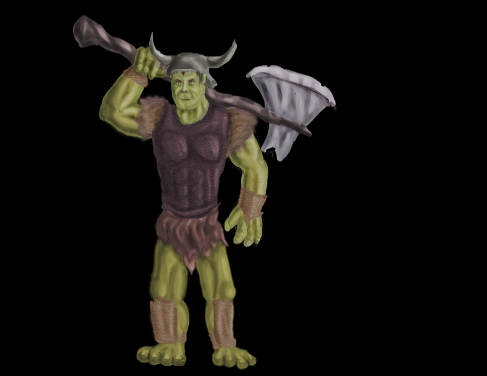
Ever since Lord of the Rings, the orcs have been picked on (considering they pretty much first appeared in those books, they've been picked on forever). Normally, they are a race of misshapen, or at least ugly, large humaniods that are stronger than they are smart. Often, they are evil, and make up the armies of the enemy, an almost limitless host that dares the good guys to defy the odds.
When talking of orcs, often they're more of a conglomeration of creatures of legend. Goblins, trolls, ogres, and others can often fit into the category 'orc'. Usually, they are big, ugly, and mean. Oftentimes they are green or brown, but they can pretty much be any color or size. The term is so general it can mean anything, really.
Lately, they've been given a little slack. Tolkien first created them as parallels to the Nazis. We don't live in a world of Nazi Germany anymore, though, so there are no clear enemies like there were then. There's no country we can point to and say, "They're evil." Some of the communist countries might have challenged, but since the collapse of the USSR, they're not so much a threat. Islamic extremists have caused us problems, but most are quick to point out that they don't represent the overall Muslim population. So, like I was saying, without any clear enemy, our need to symbolize a race of evil in fantasy has diminished. Some dark lords still use orcs or other similar races for recruitment, while others just use good old humans. The orcs are becoming more like the Na'vi in Avatar: noble savages.
In Warcraft 3 and World of Warcraft, for example, (Real time strategy and massive online role playing video games, respectively), the objective of defeating the evil orcs changed to defeating evil demons and undead. It does make them more dimensional than the evil creatures they were before, because let's face it. No culture or nation is completely evil. Even Nazi Germany had good people, they were just unable or unwilling to act out against the evil leaders put in place by Hitler, as well as not realizing at the time how he was slowly changing the nation into a monster (a dire warning for us: if any president starts radically changing the country, it probably isn't for the better).
Just like the real world, most think orc points of view should be represented in fantasy, instead of blindly pointing to them as evil monsters. It gives the world more complexity and points to more modern views: no culture is pure evil or pure good. There can be more depth to the orc race, and there are many possibilities for them to play roles they couldn't before. It is interesting that the orcs can be explored beyond their evil origins, and there is material to be used, but it gives us the question: if they are no longer just the bad guys, but are as dynamic in morality as humans, is there really any need to have them? Why not just have humans take their place?
So the future of the orc maybe isn't as bright as they thought after their change of heart. They will at least be around for two more Hobbit movies in their evil form. after that, who knows? The noble savage idea is already getting a little old itself. Were indians and africans really all that closer to mother earth? Would they have abstained from ripping her apart if they had the means? Who knows? But maybe the new role of the orc will be mother nature's champions. It wouldn't be a huge leap.
After all, they've already gone green.
Reblogged from http://sageeyesblog.wordpress.com/2013/01/23/orcs/
Subscribe to:
Posts (Atom)



